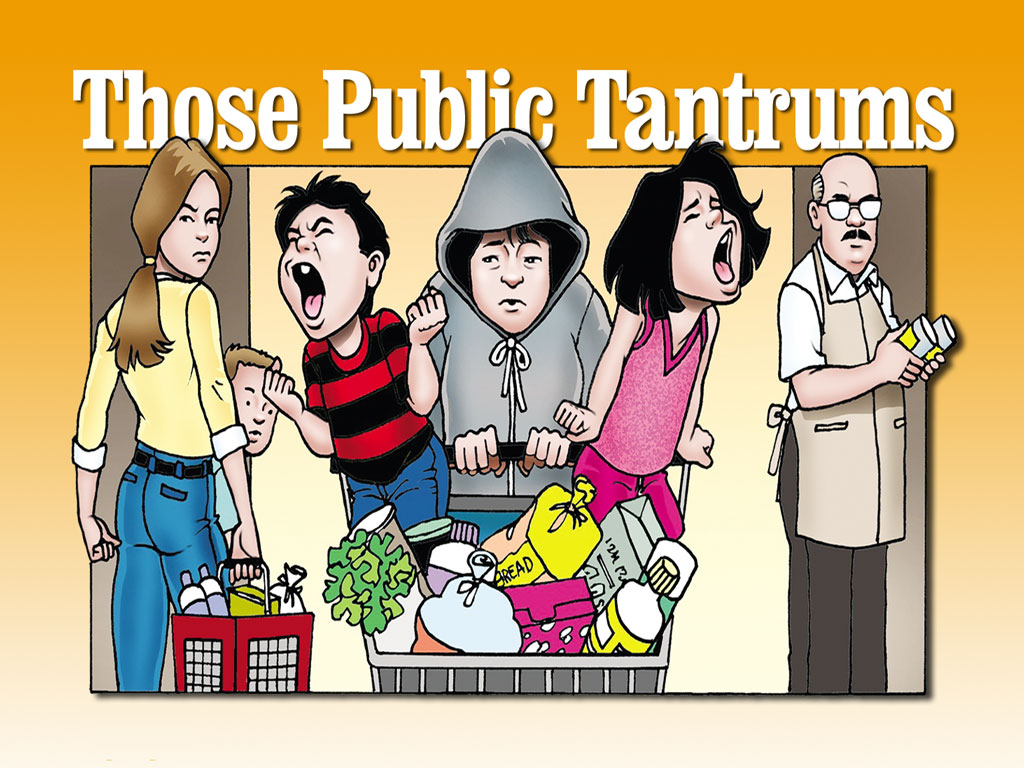by Gloria Buoncristiano-Thai
When little people are overwhelmed by big emotions, it’s our job to share our calm, not their chaos.” -L.R. Knost
Most parents have experienced their children having melt downs; however, the worst is probably the public tantrum. According to Honolulu Family Physician, Jennifer Frank, M.D., FAAFP, tantrums generally occur between the ages of 18 and 36 months. “They are a way the child is learning to express his frustration when the world is not catering to his every need.”
“Spencer had a ‘knock down drag out tantrum in the grocery store the other day.’” He wanted a toy. “Spencer was screaming at and kicking me. I calmly held him while we checked out and just ignored all the stares. It used to bother me when his older brother, Merrick, was little, but having an older child with Autism, makes you pretty much immune to the stares; especially as usually it is my 7-year-old having a meltdown in public, and this time it was just my two-year-old.”
Heather, Kaneohe
“Patronizing comments from strangers are of no help. They do not quell a full blown tantrum. Then there are the customers that glare at you as you try to leave a store with a toddler who is in a full blown tantrum. I could feel their ‘why doesn’t she give that child something to cry about?’” The answer, “Because I was trying to support her over tired, over stimulated, overly big emotions by not losing MY stuff and holding her while she railed.”
Karen, Honolulu
“My kids both had epic meltdowns at gymnastics. The setup is such that there is a glass window pane where parents watch their kids participate in gymnastics. I was in the gym trying to calm my kids down. I ended up leaving with my children under my arms as they kicked and screamed at me. It was humiliating. I was feeling like every single one of those people were watching me like I was an animal on display at the zoo. When I look back on it now, it is not as humiliating; but at the time, I was embarrassed, angry and hurt. I remember when I left, the coach said to me, ‘you are very patient.’ I felt like I kept my composure while I was in there, but literally cried hysterically when I got to the car.”
Sarah, Kapolei
“With Oliver, I pretty much know what is going to set him off. If he is having fun and we need to leave or if there is a toy that he has to leave behind because it is not ours. That kind of thing. We talk about saying bye to toys, and we talk about picking one more thing to do, but even these techniques are still over his head at 18 months. There still always comes a point when I have to physically remove him gently and patiently and empathetically. I always affirm his feelings and strapped him into the carrier and offer him the breast.
Tara, Kailua
“We were on the plane about to come back from visiting Danny on the Mainland after six weeks of separation. Malia was just about to turn 2, and this had been her longest separation from Daddy. When he walked us to the gate and did not board the plane, she lost it. She screamed, not just cried, but cried with a piercing scream, like I had never heard for 20 minutes straight until she had completely worn herself out. Of course, the passengers all around me glared, agitated and unforgivingly. It completely changed how I forever look at tantrums because I really realized, for the first time, that we never know what any child is going through. I imagined how their hearts might have softened if they knew she was crying, not because she was hungry or tired, but because she was heartbroken about leaving her daddy; and that this would be the beginning of the story of her life. I still get tears every time I think about it.”
Natalia, Ewa Beach
It is a typical reaction for many parents to be embarrassed by their child’s tantrum in public. Some instinctual reactions are to quell the tantrum immediately either by bribing, yelling or even spanking. In reality, these reactions do not ultimately work toward building healthy behaviors; according to Big Island’s Amy Elizabeth Gordon, MA, a relationship coach and former licensed mental health therapist with over 15 years of experience, as well as the mother of two young children; these reactions only serve to create fear and a feeling of a lack of safety in the child. Gordon explains that tantrums are a way of informing parents. They are an indicator that there is a rupture in the connection. Parents need to listen to the behavior. She offers the following suggestions for parents on how to better handle a tantrum situation, especially when confronted in public.
Dealing with Temper Tantrums in Public
- Parents need to be in charge without being aggressive.
- Have strength and provide safety. Be the “rock in the river.”
- React with calmness, a whisper works wonders.
- Intentional Dialog: “I am here for you. Your needs matter to me. You are important to me. I am sorry, we cannot do…at the moment, but when we finish…or another time….”
Gordon also suggests that if one is observing a tantrum happening in public, rather than judge, show compassion. “How can I help the parent. Minimize the shame, blame and criticism.”
As adults we can lose sight of the fact that toddlers do not have the verbal skills to express their frustration and feelings, which often leads to a tantrum. It can be quite disconcerting when a tantrum happens in public. As difficult as it can be, parents need to ignore those who may be staring and passing judgment. Focus on the child. Provide calmness and safety, and if need be, retreat to home base and regroup.





